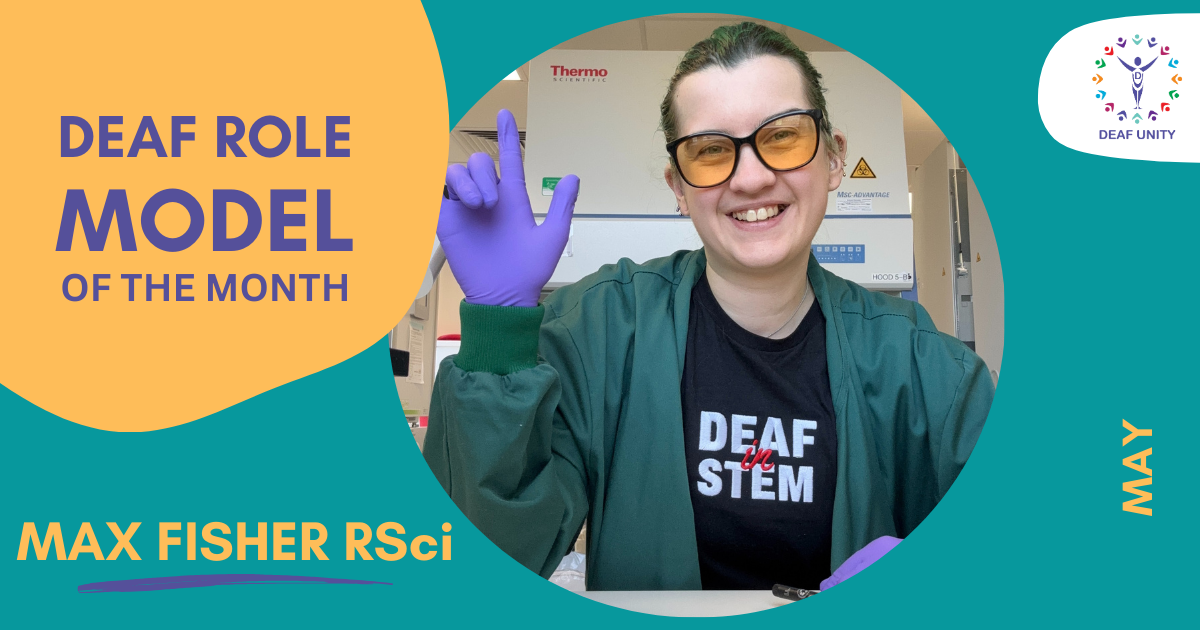
Each month we invite an inspirational or outstanding deaf role model to share their story. This can be from what they’ve learnt, to what they wish they’d have known as well as their best deaf tips.
Our role model this month is Max Fisher RSci. Max is a DeafBlind, Disabled and Genderqueer multi-award winning scientist. They advocate for inclusion in the STEM field and for LGBTQIA+ rights. Watch their introduction in BSL and read the rest of their story below.
Please tell us a little about yourself? (career, family, achievements etc.)
Hello! My name is Max (signed like Mouse), and I am a cell biologist, among other things. I work in the lab growing cells for use in research and innovation for a nanomedicine company. I am also involved in polymer testing, and development of our automation pipeline- a fancy word meaning I try to convince the robots to handle cells for me. I am also a disability and LGBTQIA+ advocate, working towards inclusion and acceptance in the STEM field. Outside of science, I am a druid, bookworm, and Stardew Valley enthusiast. I also make YouTube videos as a hobby, talking about disability, science, queerness, and druidry.
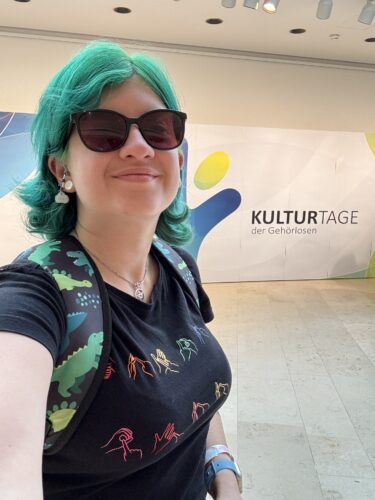
Did you grow up in the Deaf Community or come to it later in life?
I came to the community later in life. I was born hearing, and at some point along the way I slowly started losing my hearing. I got my first hearing aids in 2019, and I am currently learning BSL. Also, I have had a visual impairment called Visual Snow Syndrome for at least as long as I can remember, which I wasn’t diagnosed with until 2021. My Deaf group chat has been a life saver!
What was your experience of education and higher education as a deaf person?
My hearing loss wasn’t diagnosed until after I had graduated from my master’s degree. Studying with an undiagnosed hearing loss is incredibly difficult! You know you need to do things differently, but you can’t always explain why, and you don’t have the magic piece of paper that allows for accommodations. I became a wheelchair user towards the end of my studies, and I often found that wheelchair accessible seats were at the back of the lecture hall, when I really needed to be at the front so I could see the lecturer better.
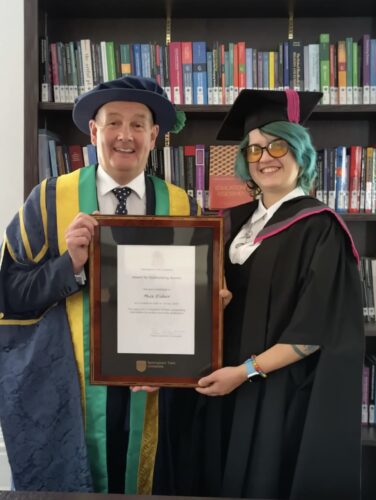
Credit – Nottingham Trent University
How did you first get into your field of work and were there any particular challenges you faced?
Getting into my field WAS the biggest challenge. I was unemployed for 3 and a half years after my graduation due to prejudice in the recruitment field. Employers often got scared by seeing terms like “Wheelchair basketball”, “trans officer”, or “DeafBlind”. Lots of people made lots of assumptions about my abilities, which was unacceptable. It wasn’t until a friend from university used his allyship to advocate for me during the recruitment process at his workplace that I was able to get an interview, and the rest is history. The discrimination didn’t stop once I was employed, though. Plenty of people are shocked when I hold my white cane and tell them I am a scientist. I’ve experienced discrimination and harassment in the workplace, which inspired me to continue to advocate for disabled and queer people in STEM.
You are a multi-award winning scientist and activist. From being Most Influential Disabled Scientist in the UK to being awarded Person of the Year Sense award, what has been the highlight of your career so far?
It is impossible to pick just one highlight! The awards are an obvious highlight, for sure. Being selected to lead a global disability employee resource group (ERG) in a former role was definitely a highlight- I got to show that I can bring my advocacy into the workplace, and have it be a part of my job. I became an alumni fellow at my alma mater, which is very rewarding, being able to go back to the place where I thought I’d never “make it”, and showing future scientists that they can do anything they want to brings me lots of joy. Similarly, being able to go out into the world, for example my work with the Rochdale Science Initiative, and bring science to Deaf people who haven’t had access to STEM before. Collaborating with Deaf Identity for British Science Week was another highlight, I was bouncing off the walls the whole time because I was getting to work with someone I’ve looked up to for a long time.
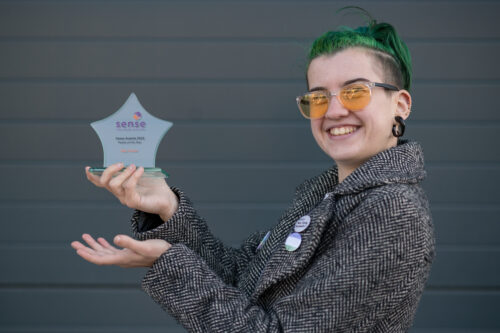
Credit – Sense, 2022
You advocate for inclusion of disabled people in STEM as well as for respect for all LGBTQIA+ people. Why are these issues important to you?
Everyone deserves to be treated with dignity, and these communities that I belong to frequently are not. I have personal experience of these things standing against me for no reason when applying for jobs, or just existing out in the world. It’s important to me that people know that disabled people can do things, and that queer people can do things, and we’re all just people like everyone else. Prejudice is, unfortunately, alive and well.
What changes do you want to see in STEM and with deaf and DeafBlind awareness over the next 10 years?
What I want more than anything is for people to understand that Deafness, and DeafBlindness, are both spectrums. Nothing about disability is black and white, it’s all on a spectrum somewhere, but people are often in disbelief when I ask them to repeat themselves and share with them that I am DeafBlind. For example, with Visual Snow Syndrome, I am night blind. So I can look down a microscope all day, but on the walk home at night, I need my white cane. That’s just normal for me. But others find it completely baffling.
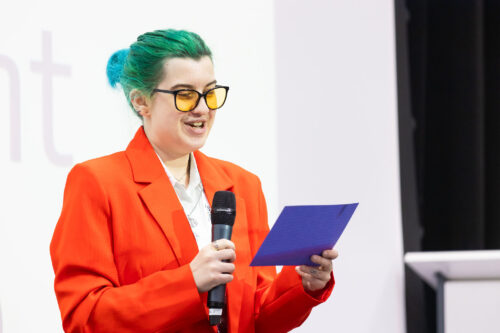
Credit – Nathan Styles Photography
You’re also a Drag King – What drew you to that and do you have any advice for those wanting to do drag too? Where do you start?
My friends were doing it and it looked really fun! I got into drag for the first time during lockdown out of curiosity, and it became a hobby. I have since performed around the UK, and at a Deaf festival in Germany. The first step is always the hardest. You don’t need to spend lots of money getting a whole new set of makeup to do drag, you can start with what you have. If you have nothing, you can start with one or two low–cost items and build from there. There’s no pressure to get your whole face right first time… You don’t even need to start with make-up! Performance is a huge part of drag, so work on your lip-syncing, or your singing, or your dancing! That’s free and fun!
Who inspires you and why? (In the deaf community or otherwise)
Luke Christian, founder of Deaf Identity, because he created an iconic brand in the deaf community, that is accessible to everyone, not just deaf people. This clothing opens the conversation to hearing people about deafness, and makes them see it as cool and fun, instead of scary.
Lesley-Ann Brewster, who was a role-model in my journey as a disabled pagan, and later a disabled druid. She always supported me and my work, and advocated for kindness above all else. As an advocate, it can be challenging, and bring up challenging emotions, and she always reminded me to slow down, think of the bigger picture, and be kind.
Alyssa Parparella, founder of Disabled in STEM. She has created a wonderful space for disabled scientists to find community, share stories and insights, and seek mentorship. She also created Disabled in STEM week, where scientists can showcase their work and their journeys to inspire other disabled scientists.
What ways do you think hearing people can be allies to the deaf community? Any DOs and DON’Ts?
DO: Ask for our communication preferences- it’s not always obvious. Just because I can stream a phone call through my hearing aids, doesn’t mean I want to. Email me instead!
DONT: Assume or hope we can lipread- While most people (hearing too!) can lipread to an extent, nobody can lipread 100% of a conversation. It’s there to help. Not as an alternative to accessible communication.
DO: Make sure we are included in conversations. If you see us struggling, ask us how you can help. Don’t let people brush over us if we ask them to repeat something.
DONT: Say “Never mind”. If it was important enough for you to say it the first time, it’s important enough to say it again until we understand it.
DO: Give us a little wave, or a little smile, or check in BEFORE you start talking- make sure we see you! Sometimes I am listening to music in my hearing aids, and I need you to let me know you want to talk to me so I have enough time to pause the music before the sentence starts.
DONT: Forget about us! I am very open about my access needs, and I’m not going to magically stop being Deaf one day. It’s OK to forget what the exact access needs are, nobody’s perfect, but please remember that I am Deaf.
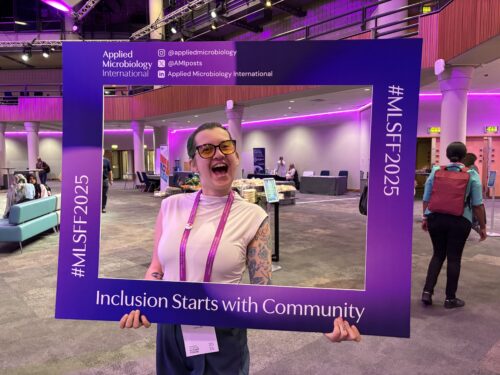
3 top tips for deaf people? (e.g. everyday life/learning/communicating/ socialising/travelling etc.)
- I have travelled abroad exactly once, but one piece of advice is to learn the phrase “I’m Deaf and I’m English” (or however you identify yourself) in the language of the place you’re going. I used Google Translate, and had it copied and pasted in my phone to show to servers, or ticket sellers, or tour guides. Very helpful!
- Be honest if you didn’t hear something. It can be dangerous if you pretend to hear something, because you can never be sure how important it was. I find it also gets people used to speaking to me. They learn that I will need things repeating, and they learn how clear they need to speak for me to hear them, and that they need to look at me.
- Decorate your hearing aids! It’s so much fun! I found it helps hearing people be less weird about them, too. But being able to decorate and accessorise makes me feel good.
You can follow Max on Instagram – @ouch_mouse and @papa_smear or on YouTube @ouchmouse
To read more inspirational role model interviews, take a look here. If you would like to be an ally to the deaf community and learn sign language, check out our courses here.
Looking for more support? We’ve made it our mission to improve the lives of deaf people everywhere. Check out Deaf Unity’s projects to find out what we can do for you. If you’d like to get in touch, contact us here.

